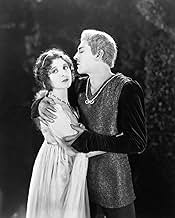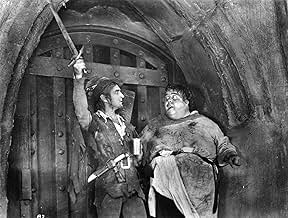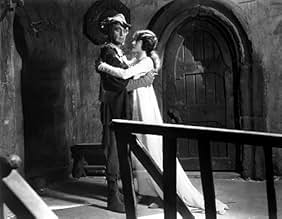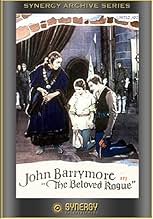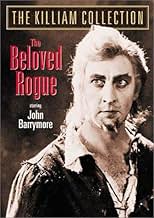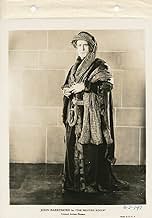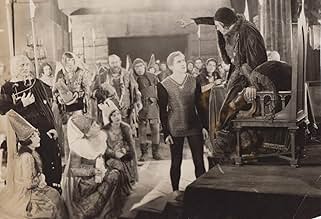NOTE IMDb
7,0/10
964
MA NOTE
Ajouter une intrigue dans votre langueFrançois Villon, in his lifetime the most renowned poet in France, is also a prankster, an occasional criminal, and an ardent patriot.François Villon, in his lifetime the most renowned poet in France, is also a prankster, an occasional criminal, and an ardent patriot.François Villon, in his lifetime the most renowned poet in France, is also a prankster, an occasional criminal, and an ardent patriot.
- Réalisation
- Scénario
- Casting principal
Nigel De Brulier
- Astrologer
- (as Nigel de Brulier)
Otto Matieson
- Olivier
- (as Otto Mattiesen)
Tom Amandares
- Man in Crowd
- (non crédité)
Louise Emmons
- Beggar
- (non crédité)
Martha Franklin
- Maid
- (non crédité)
Avis à la une
François Villon was a real-life poet and rogue who lived in Paris in the 15th century. However, most of what is portrayed in this historical film is actually fiction--from a play created at the beginning of the 20th century. Whereas in the film he met and became friends with Louis XI, in reality he died in his 30s and was never involved in all the intrigues like he was in this film. In reality, he wrote some lovely verse and was frequently on the wrong side of the law--not the combination of a patriot and Robin Hood-like character like he is in the film. Provided you know that the film is nearly 100% fiction, then it's well worth seeing--just don't assume it's a good history lesson.
In THE BELOVED ROGUE, Villon is played with wild abandon by John Barrymore. I was also pretty excited to see that his three friends were all played by very familiar faces. Angelo Rossitto, who was the plucky dwarf, played in tons of films over the years and had a very long career. Slim Summerville was a character actor known for adding a touch of comedy to films. Mack Swain is best known as the silent film foil in many of Chaplin's short films and played his partner in THE GOLD RUSH. All four of these men did a nice job and have no complaints---even with Barrymore's rather over-the-top treatment that was rather reminiscent of a Douglas Fairbanks performance. However, the performance I had a serious problem with was Conrad Veidt as King Louis XI. To call this "unsubtle" would be a gross understatement. He played the role like a high schooler who thought he was supposed to be the stereotypical Richard III--skulking about and acting like a demoniacal caricature. While Veidt was wonderful in many, many films (both silent and sound) but here he is just ridiculous.
As for the story, it's full of lusty adventure and action--like a swashbuckling film minus the sailing ships. The sets worked out well for all this, as they'd been used the previous year for THE HUNCHBACK OF NOTRE DAME. Both films were set around the same time period.
Overall, it's one of the last great silent films. There's a lot to like and the film is a lovely combination of romance, comedy and action. Well worth seeing, though it loses a couple of points for Veidt's overacting as well as the way the film plays fast and loose with history.
By the way, this film was also made twice as IF I WERE KING (1920 and 1938) and apparently these two films are closest to the original play. However, in total, six films have been about Villon and tell, more or less, variations on the same tale!
In THE BELOVED ROGUE, Villon is played with wild abandon by John Barrymore. I was also pretty excited to see that his three friends were all played by very familiar faces. Angelo Rossitto, who was the plucky dwarf, played in tons of films over the years and had a very long career. Slim Summerville was a character actor known for adding a touch of comedy to films. Mack Swain is best known as the silent film foil in many of Chaplin's short films and played his partner in THE GOLD RUSH. All four of these men did a nice job and have no complaints---even with Barrymore's rather over-the-top treatment that was rather reminiscent of a Douglas Fairbanks performance. However, the performance I had a serious problem with was Conrad Veidt as King Louis XI. To call this "unsubtle" would be a gross understatement. He played the role like a high schooler who thought he was supposed to be the stereotypical Richard III--skulking about and acting like a demoniacal caricature. While Veidt was wonderful in many, many films (both silent and sound) but here he is just ridiculous.
As for the story, it's full of lusty adventure and action--like a swashbuckling film minus the sailing ships. The sets worked out well for all this, as they'd been used the previous year for THE HUNCHBACK OF NOTRE DAME. Both films were set around the same time period.
Overall, it's one of the last great silent films. There's a lot to like and the film is a lovely combination of romance, comedy and action. Well worth seeing, though it loses a couple of points for Veidt's overacting as well as the way the film plays fast and loose with history.
By the way, this film was also made twice as IF I WERE KING (1920 and 1938) and apparently these two films are closest to the original play. However, in total, six films have been about Villon and tell, more or less, variations on the same tale!
The Beloved Rogue is a wonderful period piece. It portrays 145th century Paris in grand Hollywood fashion, yet offering a bleaker side to existence there as it would be experienced by the poor. And the snow. It's constantly swirling about, adding to the severity of the setting -- brilliant! The setting is enhanced by the odd cast of characters, including beggars, cripples and dwarfs.
A brilliant performance is turned in by John Barrymore, outdone only by the magnificent Conrad Veidt, who portrays a degenerate, dissolute Louis XI to perfection. And yes, Veidt picks his nose on purpose, pushing his portrayal to wonderfully wry limits.
A brilliant performance is turned in by John Barrymore, outdone only by the magnificent Conrad Veidt, who portrays a degenerate, dissolute Louis XI to perfection. And yes, Veidt picks his nose on purpose, pushing his portrayal to wonderfully wry limits.
Besides being entertaining in itself, with plenty of action, wit, and more, this feature gives John Barrymore an excellent role that plays to his strengths and that gives him a lot of good material to work with. Barrymore's vigorous style works well in the role, and he has many opportunities for drama, humor, and romance.
The story is based very loosely on the life of the 15th century French poet François Villon, but it really only uses the character and the basics of the historical setting. The character that the script creates, though, is not only a great role for Barrymore, but is well-conceived as a movie character. And if Barrymore's entertaining portrayal of Villon, fanciful though it is, encourages anyone to find out more about the historical Villon, so much the better.
(The real Villon was both a worse criminal and a better poet than the movie suggests. A number of his crimes were truly harmful offenses, rather than the impish pranks that he plays in the movie. At the same time, his poetry was quite a bit deeper than is suggested by the occasional light verses in the inter-titles.)
Conrad Veidt is cast as King Louis XI, Villon's sometime friend and sometimes persecutor. Veidt gives a really good turn to the character, using his physical posture and mannerisms to suggest the king's complex character.
There are a number of good sequences that are sheer entertainment, such as the catapult scene and Villon's first visit to Charlotte's palace, and that are rather impressive on the production end too. The story as a whole is the best kind of historical melodrama, with numerous turns of fortune and plenty going on.
The story is based very loosely on the life of the 15th century French poet François Villon, but it really only uses the character and the basics of the historical setting. The character that the script creates, though, is not only a great role for Barrymore, but is well-conceived as a movie character. And if Barrymore's entertaining portrayal of Villon, fanciful though it is, encourages anyone to find out more about the historical Villon, so much the better.
(The real Villon was both a worse criminal and a better poet than the movie suggests. A number of his crimes were truly harmful offenses, rather than the impish pranks that he plays in the movie. At the same time, his poetry was quite a bit deeper than is suggested by the occasional light verses in the inter-titles.)
Conrad Veidt is cast as King Louis XI, Villon's sometime friend and sometimes persecutor. Veidt gives a really good turn to the character, using his physical posture and mannerisms to suggest the king's complex character.
There are a number of good sequences that are sheer entertainment, such as the catapult scene and Villon's first visit to Charlotte's palace, and that are rather impressive on the production end too. The story as a whole is the best kind of historical melodrama, with numerous turns of fortune and plenty going on.
THE BELOVED ROGUE (United Artists, 1927), directed by Alan Crosland, offers John Barrymore the opportunity of enacting a role portrayed numerous times on stage and screen by other actors, that of Francois Villon, the first great poet of France. Villon had been portrayed on screen in IF I WERE KING by William Farnum (Fox, 1920) and Ronald Colman (Paramount, 1938); while Dennis King (1930) and Oreste (1956) did the musical versions of Paramount's THE VAGABOND KING. John Barrymore's characterization ranks one of the finer carnations as well as bazaar. Villon in THE BELOVED ROGUE is described through inter-titles as "poet, pickpocket, patriot, loving France earnestly, Frenchwomen excessively, French wine exclusively." A fun loving fool sporting Peter Pan attire with Robin Hood tights who recites poetry whenever it suits him, steals from the rich and gives to the poor, and travels along with two other companions, Jehan (Slim Summerville) and Nicholas (Mack Swain), all the similarities of a Douglas Fairbanks adventure combining Robin Hood, D'Artagnan of the Three Musketeers, and Zorro all into one. Francois Villon is far from being a fictional character originated in novels, he actually lived (1431-1463). How much displayed on screen to be fact is uncertain, but Barrymore performs in the manner of having himself a grand ole time whether romancing a girl or sliding down roof tops covered with snow. THE BELOVED ROGUE is not actually a biography of the famed poet, but the spirit of the man, undisciplined and riotous, with a gift of writing and reciting poetry.
Aside from the lighter moments mentioned that may give the impression of a costume comedy set in medieval times, THE BELOVED ROGUE starts off dramatically in Vauxcelles, France, the year 1432, with the execution of Francis De Montcorbier as he is burned at the stake in the fashion of Joan of Arc. His wife (Lucy Beaumont) who looks on with bitterness, afterword's, gives birth to a son she hopes will live for France as her husband died for it. The child grows up to become Francois Villon (John Barrymore), and 25 years later, he is seen entertaining the crowds after being elected "The King of Fools" for All Fool's Day in the guise of a clown. When he makes a witty jest at the expense of Duke Charles of Burgundy (Lawson Butt), his cousin, King Louis XI (Conrad Veidt) banishes him from Paris. Villon returns to Paris anyway, and, after supplying food and wine to the poor using the king's catapult, Villon, discovered by the king, escapes as he himself is thrown from the catapult, flying through the air and landing himself in the boudoir of Charlotte De Vauxcelles (Marceline Day), the King's ward forced into a loveless marriage to Count Thibault (Henry Victor), a henchman of a plotting Burgundy. Villon's speech and manner makes him Grand Constable of France, but after revealing the schemes perpetrated against the king, Villon is captured, tortured through flogging and pitted against the flames of fire before his death sentence is to be carried out. This is followed by one of the more memorable scenes where the weakened Villon is placed inside a metal cage-like structure as it is lifted up and left dangling outside the window of the palace tower where Charlotte is held prisoner before her proposed wedding. With much more to follow, the movie fails to disappoint.
The supporting cast includes Rose Dione as Marget; Angelo Rossito as Beppo, the dwarf; and Dick Sutherland as Tristam L'Hermite, the busiest man in France - the executioner. Look quickly for future child actor Dickie Moore early in the story as the infant Francois. German actor Conrad Veidt, making his Hollywood debut, comes close to being unrecognizable as the eccentric King Louis XI. Described as "superstitious, crafty, cruel, and a slave to the stars," he fails to make a move without the advise of his astrologer (Nigel DeBrulier). Marceline Day performs her task well in the typical damsel in distress manner.
Not as well known as Barrymore's notable silents as DON JUAN (Warners, 1926), THE BELOVED ROGUE is a lavish scale production with Paris settings reminiscent to ORPHANS OF THE STORM (1921) and THE HUNCHBACK OF NOTRE DAME (1923), compliments of set designer, William Cameron Menzies. Good camera angles and overhead camera shots also add to numerous shots of Barrymore's classic profile.
THE BELOVED ROGUE was one of the 13 silent features aired on public television's "The Silent Years" (1971) hosted by Orson Welles, from the Paul Killian film collection accompanied with excellent piano score by William Perry, the same print distributed on video cassette in 1998 by Critic's Choice Masterpiece Collection (from which this review was based). At the length of 99 minutes, running times may differ due to projection speed. Other distributors such as Video Yesteryear in the 1980s possess a copy to THE BELOVED ROGUE at 147 minutes. Which version is better depends on the individual viewer. THE BELOVED ROGUE might be one of the most overlooked of all silent movies due to the lack of television revivals in recent years, however, it is something to consider, especially for silent film enthusiasts and/or film historians who enjoy watching both Barrymore and Veidt hamming it up to a point of laughter and disbelief, when seen on Turner Classic Movies (TCM premiere: September 28, 2022). (***)
Aside from the lighter moments mentioned that may give the impression of a costume comedy set in medieval times, THE BELOVED ROGUE starts off dramatically in Vauxcelles, France, the year 1432, with the execution of Francis De Montcorbier as he is burned at the stake in the fashion of Joan of Arc. His wife (Lucy Beaumont) who looks on with bitterness, afterword's, gives birth to a son she hopes will live for France as her husband died for it. The child grows up to become Francois Villon (John Barrymore), and 25 years later, he is seen entertaining the crowds after being elected "The King of Fools" for All Fool's Day in the guise of a clown. When he makes a witty jest at the expense of Duke Charles of Burgundy (Lawson Butt), his cousin, King Louis XI (Conrad Veidt) banishes him from Paris. Villon returns to Paris anyway, and, after supplying food and wine to the poor using the king's catapult, Villon, discovered by the king, escapes as he himself is thrown from the catapult, flying through the air and landing himself in the boudoir of Charlotte De Vauxcelles (Marceline Day), the King's ward forced into a loveless marriage to Count Thibault (Henry Victor), a henchman of a plotting Burgundy. Villon's speech and manner makes him Grand Constable of France, but after revealing the schemes perpetrated against the king, Villon is captured, tortured through flogging and pitted against the flames of fire before his death sentence is to be carried out. This is followed by one of the more memorable scenes where the weakened Villon is placed inside a metal cage-like structure as it is lifted up and left dangling outside the window of the palace tower where Charlotte is held prisoner before her proposed wedding. With much more to follow, the movie fails to disappoint.
The supporting cast includes Rose Dione as Marget; Angelo Rossito as Beppo, the dwarf; and Dick Sutherland as Tristam L'Hermite, the busiest man in France - the executioner. Look quickly for future child actor Dickie Moore early in the story as the infant Francois. German actor Conrad Veidt, making his Hollywood debut, comes close to being unrecognizable as the eccentric King Louis XI. Described as "superstitious, crafty, cruel, and a slave to the stars," he fails to make a move without the advise of his astrologer (Nigel DeBrulier). Marceline Day performs her task well in the typical damsel in distress manner.
Not as well known as Barrymore's notable silents as DON JUAN (Warners, 1926), THE BELOVED ROGUE is a lavish scale production with Paris settings reminiscent to ORPHANS OF THE STORM (1921) and THE HUNCHBACK OF NOTRE DAME (1923), compliments of set designer, William Cameron Menzies. Good camera angles and overhead camera shots also add to numerous shots of Barrymore's classic profile.
THE BELOVED ROGUE was one of the 13 silent features aired on public television's "The Silent Years" (1971) hosted by Orson Welles, from the Paul Killian film collection accompanied with excellent piano score by William Perry, the same print distributed on video cassette in 1998 by Critic's Choice Masterpiece Collection (from which this review was based). At the length of 99 minutes, running times may differ due to projection speed. Other distributors such as Video Yesteryear in the 1980s possess a copy to THE BELOVED ROGUE at 147 minutes. Which version is better depends on the individual viewer. THE BELOVED ROGUE might be one of the most overlooked of all silent movies due to the lack of television revivals in recent years, however, it is something to consider, especially for silent film enthusiasts and/or film historians who enjoy watching both Barrymore and Veidt hamming it up to a point of laughter and disbelief, when seen on Turner Classic Movies (TCM premiere: September 28, 2022). (***)
Along with DR JEKYLL & MR HYDE, this 1927 action/adventure flick remains one of the best John Barrymore silent vehicles currently available to us. Here "The Great Profile" invades Douglas Fairbanks territory and more than holds his own. There is so much to like about this film that it's hard to know where to begin. Aside from Barrymore's charismatic performance there is the American debut of Conrad Veidt. Just observe his body posture as Louis XI and you'll see what silent screen acting is all about.
Then there is the opportunity to see Mack Swain away from Chaplin and Sennett. The sets by William Cameron Menzies are staggering and the camera work by Joseph August is among the finest in silent film. It was all brought together by Alan Crosland who is best remembered for directing THE JAZZ SINGER although this picture was much more typical of his style.
The print utilized for this DVD is taken from the Killiam Collection and is the same as the one issued by Image Entertainment in 2002. Although it's a little worn in places, the new transfer has better picture quality with the tinted scenes toned down compared to the old Image version.
The William Perry piano score, while not in state of the art sound, has been enhanced and is a great improvement over the previous release. It remains a good example of what a silent piano score should be. A rare opportunity to see John Barrymore in his prime with many other things to savor. It still excites the senses after all these years...For more reviews visit The Capsule Critic.
UPDATE 2024: A 35mm print was recently discovered in the Library of Congress. It has been restored and is a significant improvement over the old Killiam print which had numerous issues. The orchestral score by Robert Israel easily supplants the old William Perry piano score. It's currently available on Blu-ray from Kino.
Then there is the opportunity to see Mack Swain away from Chaplin and Sennett. The sets by William Cameron Menzies are staggering and the camera work by Joseph August is among the finest in silent film. It was all brought together by Alan Crosland who is best remembered for directing THE JAZZ SINGER although this picture was much more typical of his style.
The print utilized for this DVD is taken from the Killiam Collection and is the same as the one issued by Image Entertainment in 2002. Although it's a little worn in places, the new transfer has better picture quality with the tinted scenes toned down compared to the old Image version.
The William Perry piano score, while not in state of the art sound, has been enhanced and is a great improvement over the previous release. It remains a good example of what a silent piano score should be. A rare opportunity to see John Barrymore in his prime with many other things to savor. It still excites the senses after all these years...For more reviews visit The Capsule Critic.
UPDATE 2024: A 35mm print was recently discovered in the Library of Congress. It has been restored and is a significant improvement over the old Killiam print which had numerous issues. The orchestral score by Robert Israel easily supplants the old William Perry piano score. It's currently available on Blu-ray from Kino.
Le saviez-vous
- AnecdotesThis film was considered lost for many years until a copy, with the original tinting, was found in the late 1960s in the personal archive of Mary Pickford.
- GaffesWhen François and others leave the King's presence, they turn and walk away. It was forbidden for any to show their back to the King; they should have departed by backing away until they were out of his sight.
- Citations
François Villon: Happy is Paris, where fools reign once a year - while everywhere else the fools reign all the time!
- ConnexionsFeatured in Hollywood (1980)
Meilleurs choix
Connectez-vous pour évaluer et suivre la liste de favoris afin de recevoir des recommandations personnalisées
Détails
- Durée
- 1h 39min(99 min)
- Rapport de forme
- 1.33 : 1
Contribuer à cette page
Suggérer une modification ou ajouter du contenu manquant


